Emmy Talk: ‘Jessica Jones’ Star David Tennant on Emotionally-Stunted Kilgrave and the ‘Dynamic Duo’
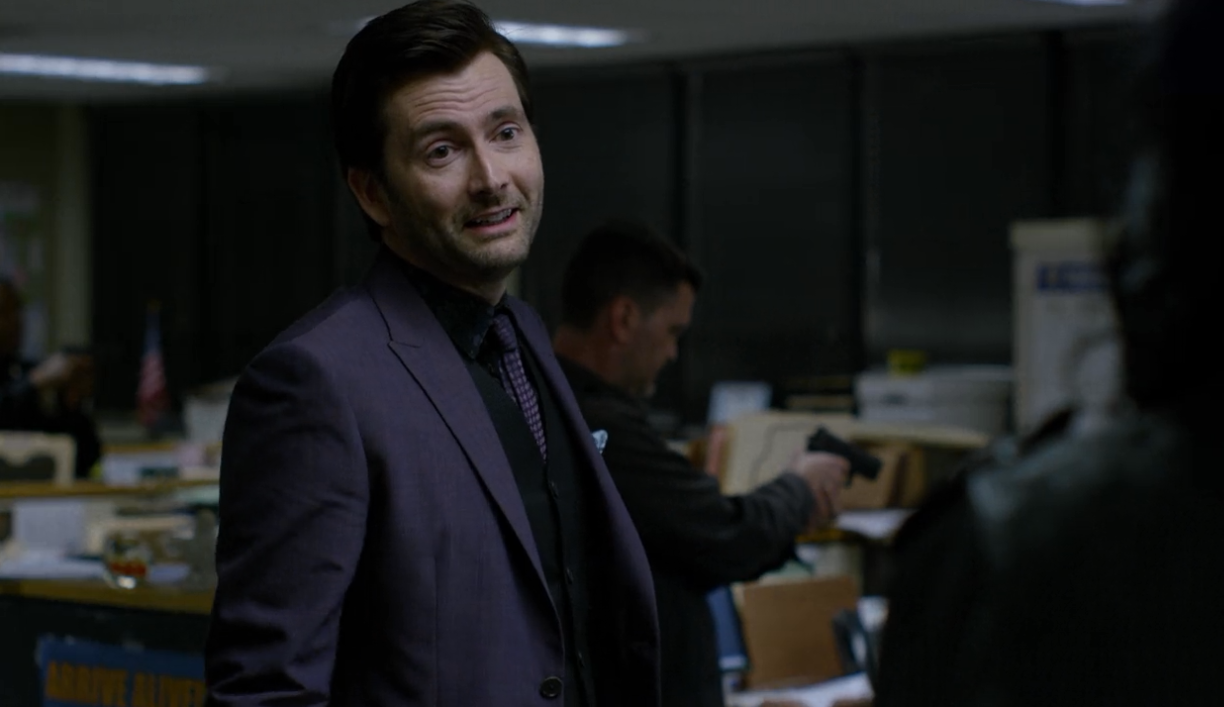
David Tennant in ‘Marvel’s Jessica Jones’ (Photos: Netflix)
As we enter Emmy season — nomination voting runs June 13 to 27 — Yahoo TV will be spotlighting performances, writing, and other contributions that we feel deserve recognition.
For many fans of Marvel’s Jessica Jones, the Netflix series’ most compelling hours are episodes 7, 8, and 9 — “AKA Top Shelf Perverts,” “AKA WWJD?” and “AKA Sin Bin” — because they’re when we start to learn more about David Tennant’s villainous Kilgrave. A man with mind-control capabilities, he’s back to, in his view, genuinely woo Krysten Ritter’s titular private eye, who’d spent a year of her life under his spell and in his bed before breaking free and leaving him for dead.
The arc finds Kilgrave proclaiming his love for Jessica (in a police station, where he has officers pointing guns at each other to ensure his safety, should superhero Jessica turn violent); inviting Jessica to live in separate bedrooms with him in her childhood home (which he has painstakingly decorated to look exactly as it had before her brother and parents died in a car crash); and pruning in a tank as Jessica tries to bait him into using his mind control on video (so she can prove a young woman killed her parents on his command).
Tennant — who infuses Kilgrave with layers of charm, pain, entitlement, and rage — took a break from filming the third and final season of Broadchurch to revisit those three episodes with Yahoo TV, and discuss Kilgrave’s reaction to hearing Jessica use the term “rape” and why that’s a conversation he hopes Broadchurch will continue, albeit in a different way.
Related: David Tennant Answers Our Burning Questions… Sort Of

You’ve talked before about how Kilgrave is a different kind of villain because his motivation isn’t to rule the world; it’s basically just to live his own best life, and that means having Jessica for himself. Let’s start with the police station scene in episode 7, where he makes that demented declaration of love. What was your reaction when you first read that scene? What excited you about it?
It’s quite shocking when he actually says, “I love you.” I don’t think you see that moment of honesty coming, or I didn’t anyway — that he should be so candid with her in that moment. I think it’s exciting because you realize the depth of his passion for her, but there’s also a wonderful naiveté to it, which I think takes you aback, and I think ends up being quite revealing about who he is. He’s a man who has never quite grown up because he’s never really had the journey that most of us would have, where we have to learn about compromise and about negotiating around other human beings. He’s never had to do that because of this extraordinary gift or curse that he’s been saddled with.
There’s something kind of wonderful and childlike and naive and rather touching almost about the fact that he can make such an ill-judged confession to her, because I think in that moment, you see how at sea he is in the world of human emotion and how far from empathy he really is. It’s shocking for Jessica to see him reveal himself that way, and it comes in the midst of him being rather cruel and rather vindictive, and the fact that this character can switch from that callousness and that rather breathtaking open-heartedness on a dime makes it wonderful to play. Quite difficult to play, I suppose, but it’s a wonderful challenge to try and find that capriciousness in that scene.
He ricochets from one thing to another, and it’s an extraordinary bit of writing, I think, because we haven’t really gotten to know him yet: He’s just existed as this shadowy boogeyman, really, through the whole show to that point. It’s the first time he reveals anything about himself and when we really get to see him for any length of time, certainly when we get to see him looking Jessica in the eye. And it’s the first time we get to see their bizarre, co-dependent relationship. For Jessica, it’s that, too, although in a very different way.

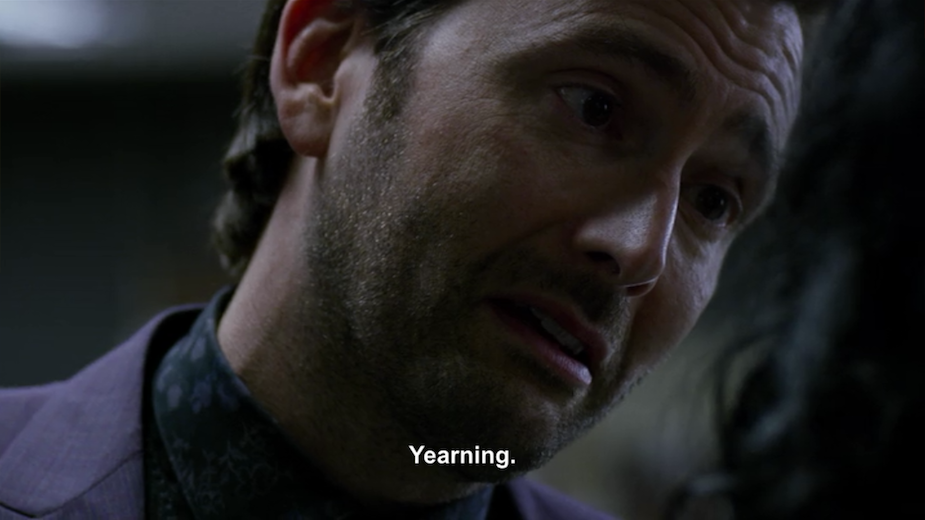
When you stand close to her and say it’s the first time Kilgrave’s felt yearning — it almost feels like a teenage way of expressing it, because the word “yearning” is one-sided. It takes into no account what the other person is feeling, at all.
Absolutely, and that’s been his Achilles heel. That is why he’s so fascinated by Jessica, because she’s managed to wriggle out of his control. [She’s] become the one thing he can’t have, which is, of course, the one thing he desires more than anything else — which is very human. We all want what we can’t quite get sometimes, especially as teenagers perhaps. Emotionally, he’s a teenager at best still. From an acting point of view, it’s delicious. It’s such a lovely character to get to play with.

When you’re filming that kind of scene, is it long takes, or are you breaking it up and having to calibrate each and every second where he’s at emotionally?
There’s a bit of breaking it up, but the filming of that particular scene we did tend to do in long, swooping takes. It was interesting. That was actually our production office converted into a police precinct. There were so many people in the scene, it felt like something of a theater performance with a bit of an audience, which of course made you deal with more anxiety. It was quite useful for Kilgrave because he is performing for the room as well as for Jessica. I quite enjoyed the sense of theater performance that that gave it, but that’s my background. That’s where I started, so I think I responded to that.

It really feels like the precinct is his stage and he wants to direct the scene. Like when he starts yelling about the fluorescent lights, the cockroaches…
Yes, absolutely. That’s exactly what he does. Having all the cops pointing guns at each other, the fury when somebody’s phone goes off because that wasn’t in his script. Again, the infantile rage that everyone’s not dancing to his tune, which always undercuts any moment where he tries to make himself vulnerable. And then you see his vulnerability is not to do with his inability to get a girlfriend.

And Kilgrave swinging the severed head in the bag on his way out — nice touch.
When you’re given a prop as delicious as that, it’s hard to not try to make the most of it. There’s not many scenes where you get given a severed head in a plastic bag. One of the many uniquenesses of playing a character like that.
Related: ‘Jessica Jones’: Inside Episode 8 With Creator Melissa Rosenberg and Writer Scott Reynolds

Moving on to episode 8, it was one of Yahoo TV’s Best of 2015 picks. I talked with Scott Reynolds, who wrote it, and he said when he realized he’d gotten the episode that was essentially two people in a house, which would play largely like a play, he was both excited and scared.
It’s one of the things that really impressed me with what Melissa [Rosenberg, the showrunner] and Scott and the whole team attempted with this, that halfway through a superhero show, you’re suddenly right next to the Odd Couple. It’s quite a bold thing to do, and yet it just allows those characters to suddenly blossom. You get to understand all their contradictions. It’s an extraordinary challenge to set yourselves as writers, and I think as performers, that you suddenly take it all down, you make it all a chamber piece, really. There’s very few stunts. Nothing much explodes until the very end, and it’s certainly a different type of a show, and yet, because you’ve got to know those characters and you’ve got to suspect what they might be, hopefully we’ve earned the chance to just move into a completely different gear by that stage.
It’s all in the writing. That had to be done very deftly, and indeed it was, but for Krysten and myself, it was such a gift to get to play these really complicated, psychological odd scenes between these two characters who should never really sit down and talk to each other. To paint them both into this corner where they’re forced to live together as a weirdly dysfunctional couple, it’s a masterstroke really of the writers, and that just gives you such lovely stuff to play with as actors.
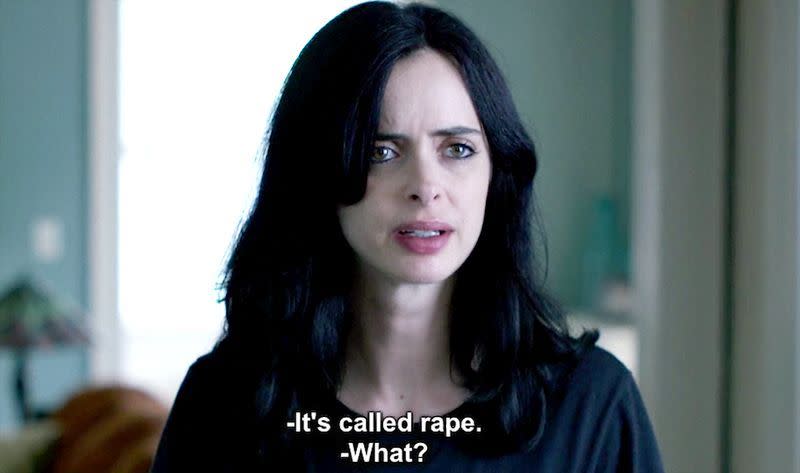
The episode has one of the show’s most talked about scenes: when Jessica explains to Kilgrave that what he’d done to her was rape. As Kilgrave, you to have to convey that he never saw it like that.
That’s exactly it. I remember reading that for the first time and being quite shocked. It’s a very charged word, quite rightly, and it’s a word that isn’t used, and must never be used, lightly. We’ve got to understand the reality of this, and the different perspectives these characters have has to be understood by the audience. Indeed, that’s what Jessica suffered. You’ve got to understand the power of that, and the depth of the horror of that for Jessica, to understand how far away Kilgrave is from reality that he sees it in a completely different light.

What’s been very pleasing is that I think the writers handled that sensitively enough that people have responded to that in such a profound way. All sorts of things have been written about sexual violence on the back of that. Again, I’m just so in awe of how Melissa and Scott and the rest of the writing team managed to nuance that within the context of a superhero show. It went to somewhere more profound than you would expect, and we got to talk about some real issues about consent and about sexual violence. I’m very proud of that.
I feel like one of the great things about casting you in this role is that you’re so innately likable that the audience is waiting for Kilgrave to give us a tiny opening to think he’s not completely horrible. In this episode, after Jessica shows him how he could use his power for good and they peacefully end a nearby domestic disturbance, a part of us — as viewers who’ve enjoyed this Odd Couple hour — wants to see Jessica stay with Kilgrave to “even the scales” some more as a “dynamic duo.” You feel guilty about it, but even Scott said the writers briefly contemplated whether they had another episode in them and that his wife was like, “Hon, I wish she would have done it, kind of.” It’s a great compliment to you, that you could bring this character to that place. And as Scott said, “It was important that [Kilgrave]’s so likable in this moment — because a lot of times, the predator is that way. It’s an important discussion for society today.” How did you navigate that line for Kilgrave?
I just play the script, and they wrote it beautifully. It’s just recognizing that for Kilgrave, that’s something genuine — he’s never really considered that way of living his life, and for a moment he’s thrilled. He’s thrilled because he and Jessica are working together. They are, as you say, the dynamic duo, and for him that’s all he wants. At the same time, he manages to do something rather extraordinary and he makes someone’s life better. Again, it’s that childish naiveté that he has. He has never considered that as a possibility. He’s got a psychopathic streak in him, which really doesn’t understand empathy, so it could’ve never been in his capacity to understand that he could make things better.
In a way, that is the same selfish bubble that means that he never really appreciates that he could rule the world or he could take over America or whatever else a super villain might do. For him, it’s just about his selfish little bubble of acquiescence that he lives within. For a moment, Jessica wrenches him out of that, and he rather enjoys the fact that people are grateful, that people think he’s rather wonderful. That tickles him and excites him, and it’s a new experience. He can have every experience the second he expresses a desire for it. So to have something new, to experience the thrill of being a duo, is wonderful for him in that moment. I think he gets intoxicated with the possibility. I just tried to play that sense of his thrill at the possibilities.
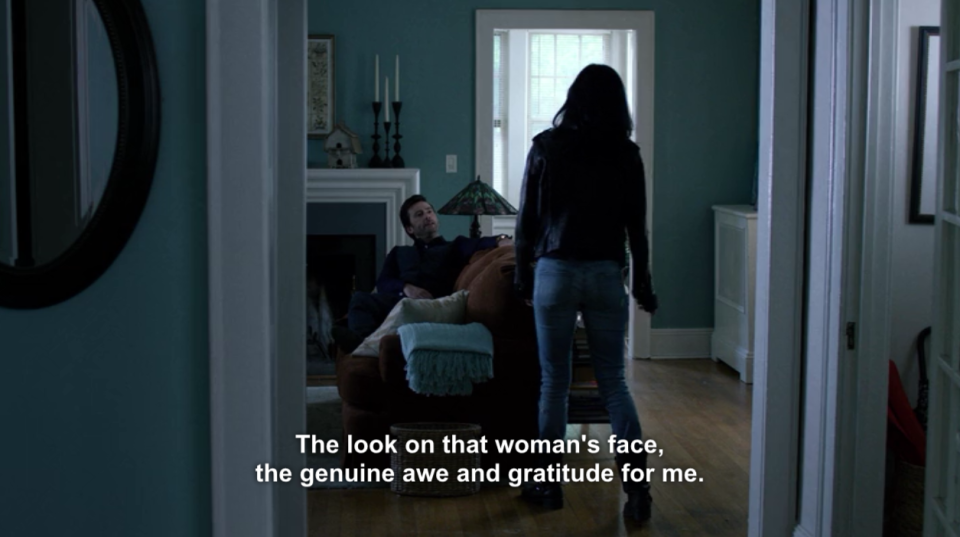
Is there any part of you that wishes there would’ve been time for another episode where we actually saw them as a dynamic duo?
Oh, sure. He would’ve loved it. He would’ve had such a good time. Jessica would’ve become a sort of Jedi, teaching him how to be good, teaching him how to use his powers for the sake of humanity. It would’ve been a very steep and unusual learning curve for him. It would’ve been fascinating to see how he would’ve coped with that. I don’t know how long he realistically could’ve kept it going either. [Laughs] He would rather quickly have gotten bored with helping people out. It would’ve been interesting to play it out perhaps a little further and see how far that particular elastic might stretch.
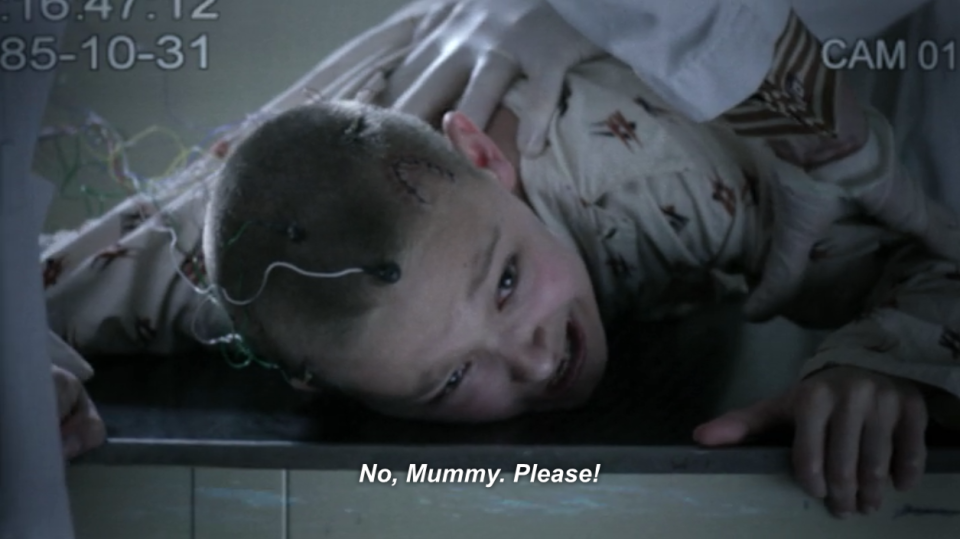
Kilgrave’s backstory with his parents is revealed in episodes 8 and 9, and our level of sympathy changes as we learn the whole truth. Did you know the full story as you were filming episode 8?
I had some notions of the overall arc, but I was learning a lot of that along with everyone else when the scripts were issued. The fact that he was called Kevin was a bit of news to me and to everyone: In the comics, he’s called Zebediah Killgrave. I was listed as Zebediah Killgrave on the call sheet. I was Zeb K on the door of my trailer. So I think it took most of production by surprise, the detail of his backstory.
As all those things got revealed to me, it just makes him more and more interesting and more and more fascinating. I think as an actor, you’ve always got to be a little bit in love with the character you’re playing, however monstrous they are. Of course, that kind of backstory certainly allowed me to indulge that fantasy that Kilgrave was misunderstood and not really a bad person after all, which is quite hard objectively to realize. From the day to day reality of inhabiting someone, you’ve got to find the empathy, however scant it might be.

In episode 9, Jessica holds Kilgrave hostage in a tank, in a foot of water so she can electrocute him to knock him out when needed. He says his feet are pruning, which made me wonder what it was like for you to actually film in there?
Oh, they were very much pruning. Unlike the house, which was a real suburban house, we built that sealed tank in the middle of a sound stage and filled it with water. You can’t easily get a lot of electrical equipment in and out, so I was often sealed away in there for long periods of time. At worst, there were flashes of seeing what it would be like to be in solitary confinement, because you couldn’t get in or out very easily. If you shot from inside the cell, you had to drain it and dry it before they brought in all the various cable-age. I don’t want to overstate it, but there was something quite isolating about being shut in there a lot of the time. You couldn’t really hear what was going on outside. You couldn’t really tell what they were setting up next, or where they were going next. That certainly helped the atmosphere for shooting it.
Again, what a fantastic setup. What an extraordinary set of given circumstances from an acting point of view, to be locked into that scenario. There’s kind of a reboot at the start of each of those episodes that we’re talking about. They’re so extreme that you couldn’t really have predicted it. That’s great, within the arc of one story, to get to have all those different power dynamics between these two characters.

Another credit to your acting is, I was wondering if some of his apology to his mother for making her burn her own face with an iron when he was young might’ve actually been genuine — before she, of course, tried to stab him and he turned on her. In your mind, was any second of that genuine, or was that all just him again playing for the camera?
I think he manages to be all things to all people at all times. I think it’s both. I think clearly his parents have f–ked him up very deeply. Clearly, he’s going to have a myriad of emotional responses to seeing them again. On one level, I’m sure he does want to apologize to his mother, and at the same time, he wants her to cut her own heart out with a knife, or with a pair of scissors, which is exactly what she ends up doing.
I think all those things can coexist in the sanest of us, so for someone who is as troubled and as psychopathic as Kilgrave clearly is, I think those apparently contradictory sensations can work together very comfortably. I think he’s deeply conflicted. Perhaps I should’ve found it more difficult, but I had no problem in setting all those things side by side at the same time. [Laughs] I think that makes perfect sense in Kilgrave’s world.
Related: 'Broadchurch’ Third & Final Season Adds Cast; New Case To Tie Up Trilogy
I know that the crime your Alec Hardy and Olivia Colman’s Ellie Miller are investigating in Season 3 of Broadchurch is a sexual assault. Did any conversations you had around Jessica Jones inform how you’re approaching this season of Broadchurch?
The two characters are obviously coming from very different standpoints: Alec Hardy is a much more empathetic character than Kevin Kilgrave. They are on different sides of the argument, although we’re still in very early days with Broadchurch. What’s really interesting on that is so far Hardy is trying to come to terms with the psychology of someone who would commit a crime like that. Kilgrave can’t really understand what he’s done wrong. I think it’s interesting that this is an area that we want to tell stories about at the moment. I think it’s something that society is having a war with itself about. As a society, we are being a bit more honest about how we’ve not really dealt with these issues in the past and how a bit of redressing needs to be done in terms of how we deal with gender politics and sexual politics as well. I think Jessica Jones inspired some very interesting arguments and debates, and I hope that Broadchurch will do the same, but from a very different type of storytelling, I think.
Anything you’d like to say in closing?
It’s great to talk about Jessica Jones again. It continues to surprise me, the breadth of people who have been caught up in its story. It’s wonderful. Even as I talk about it again now, it makes me keep questioning and wondering, and that’s what the best drama does. I’m just very proud to be part of that.
Related: Emmy Talk: Krysten Ritter’s Scene to Remember
‘Marvel’s Jessica Jones’ is streaming on Netflix.
Read more Emmy Talks:
Emmy Talk: ‘People v. O.J. Simpson’ Star Sterling K. Brown on Giving Darden His Due
Emmy Talk: ‘Silicon Valley’ Star Thomas Middleditch on Richard Being ‘Stationary, at Best’
Emmy Talk: James Corden on 5 Moments That Define His ‘Late Late Show’
